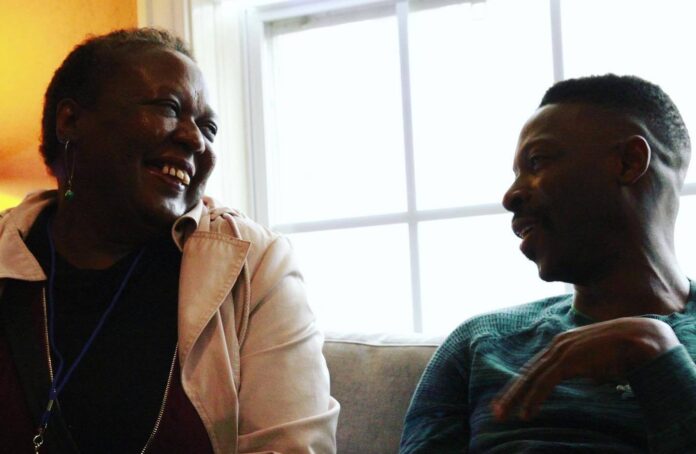On the series “So Soul San Francisco Black Art Salon,” newly available on Youtube after a long history of being staged in Bay Area venues, co-hosts and theater cornerstones Edris Cooper-Anifowoshe and Rotimi Agbabiaka appear behind a kitty-cat coffee mug and in front of a cherry-stained panel with jade-colored ceramic (in Agbabiaka’s case) and before a Zoom backdrop of a cityscape from their guest’s home country (in Cooper-Anifowoshe’s).
Both are comfortable settings for the hosts’ charms. Agbabiaka’s delivery and heartfelt delivery recall Mr. Rogers’ soothing timbre. Anifowoshe’s banter with guests about mutuals, stage shows gone by, and vows of future collaborations make her interviews seem like you’re dropping in on a chat between friends, which you are.
Good vibes—but the most reassuring aspect of the project is the strong global community of Black artists that “So Soul San Francisco” highlights.
“Instead of getting depressed by the limitations of our new virtual reality, we wanted to celebrate our increased ability to gather beyond the physical borders of this city or this country,” Agbabiaka tells 48 Hills over email. “We also felt it important, at this time of sustained (and often quite narrow) discussion about race and Blackness in the American theatre, to open up that discussion geographically and ideologically.”
These gracious Zoom sets are far from the first stages to host “So Soul.” The series was started by Cooper-Anifowoshe at the Sugar Shack Performance Gallery & Cultural Center, a Black art space she owned and operated in the Lower Haight. Initially funded by the SF Arts Commission, more recently the series has been staged at Brava For Women In The Arts by the Black Artists Contemporary Cultural Experience, a company in which Cooper-Anifowoshe is producing artistic director and Agbabiaka is a producing artist.
The COVID-friendly debut online episode of “So Soul” was released September 18 through BACCE’s Youtube page. It features each host chatting up a Berlin-based artist—drag cabaret performer George N Roses, a.k.a. Lola Rose, and West End and Royal Shakespeare Company actor Colin Griffiths Brown.
Griffiths Brown, a British musical comedy veteran who tours in a duo with wife Rebecca Carrington, provides an astute assessment of professional needs of creatives in Europe. California émigré and Tipsy Berlin resident queen N Roses reflects on his recent solo show, and the way his career evolved upon leaving the City by the Bay and the US with it. For one, the explicit sex acts that are possible in the all-night clubland of Berlin “would be frowned upon” in San Francisco, he says.
“POC deserve to see the rest of the world,” N Roses continues. “I’m trying to convince everybody to move over.”
In episode two, “So Soul”‘s hosts join forces to speak with Dr. Niyi Coker, director of San Diego State University’s department of theater, television, and film. Coker shares impactful memories of working during an artistic heyday of Ife, a center of Yoruba faith in southwestern Nigeria—before dramatic defunding impacted much of the country’s academic institutions. The far-ranging discussion also covers the “humanization” of linguistic links between AAVE and African languages, and global Black theater, of course.
“We have way more in common than we have in terms of difference,” Coker concludes.
The exchanges have brought up subjects that have surprised even the show’s hosts. “We’ve been finding that these chats give us a chance to learn so much more about people we thought we already knew,” Agbabiaka says.
Though in-person theater productions are still out of reach due to COVID-19 health restrictions, increasing numbers of productions from across the world are being made available to online audiences. Berlin’s Schaubuhne Theatre put screenings of its past productions on the internet when the pandemic hit, inspiring Agbabiaka and Cooper-Anifowoshe, with what Agbabiaka calls, “the rich intelligence and fearless creativity of their work.” Agbabiaka recently released a radio play version of Seeing Red, the 2018 San Francisco Mime Troupe production whose original script he wrote. Another source of coronavirus era inspiration for the “So Soul” co-hosts was San Francisco’s Drag Alive Twitch channel and “Youtube gardening tutorials are giving us life as we’re both cultivating pandemic gardens,” Agbabiaka says.
Now, the two are planting their own seeds with “So Soul”‘s online incarnation.
“Just put out what you feel led to and hope that it speaks to someone on their couch or in their garden,” says Agbabiaka. He teases that the next episode (which will air November 21), will feature a China-based Black actor’s take on the recent Beijing production of A Raisin in the Sun directed by Ying Da. If the prospect of an internationally Black take on cultural appropriation speaks to you, perhaps you’ll tune in.
New episodes of “So Soul San Francisco Black Art Salon” come every third Saturday of the month at 11 a.m. (the next on November 21st) on the Black Artists Contemporary Cultural ExperienceYoutube page. More information on the project here.






